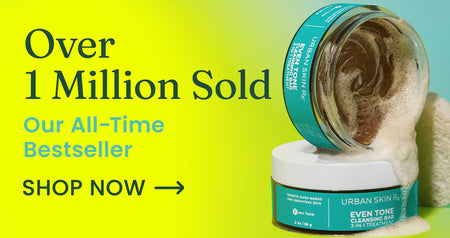What Types of Skin Are Prone to Acne and Blemishes?

It’s one of the most common skin problems in the world — and one of the most annoying. If you’ve struggled with acne, it probably started appearing around puberty. And while many of you will probably be lucky enough to have your acne subside as you get older, others may have to deal with breakouts pretty much forever.
Even if your skin isn’t particularly acne-prone, pimples and zits are just an unfortunate part of life. We know that. And even Instagram models with their is-that-a-filter smooth skin wake up with a blemish now and then.
However, certain skin types are more prone to acne than others. So if you find yourself dealing with pimples more often than you would like, you might have one of them! Suppose you’re looking for a more effective or more comprehensive treatment or are just desperate to stop recurring breakouts. In that case, the first step toward improving acne-prone skin is fully understanding the root of your issue as well as your skin’s needs.
What Skin Types Are Prone to Acne?
You probably know this already, but the skin type most prone to acne and related blemishes is oily skin. If your sebaceous glands produce more oil than is needed, your pores are more likely to end up clogged. The oils can also trap dirt and grime on your face, making it easier for bacteria and other nasties to linger on your skin and settle into your pores.
Acne is most common — or at least most irritating — on your face, but you can get acne pretty much on any part of your body with sebaceous glands…which means all of it. Those with oily skin may find that their acne spreads, because if you touch your face and then touch other parts of your body, you may be spreading those oils and clogging pores elsewhere, like your back and shoulders.
Although it might feel like a completely different thing when you’re dealing with a skin issue on a less-tended part of your body, it’s the same as having acne on your face. Which is good news! Because if you figure out how to treat acne there, you’ll know how to handle it anywhere else it may appear, too.
Once you finetune your process for getting rid of the acne on your face, you can apply similar steps to any acne you are dealing with elsewhere.
What Makes Your Skin Susceptible?
If you have oily skin, you’ve probably heard the frustrating but false misconception that your skin is oily because you’re in some way not keeping up with your hygiene. This isn’t true! One of the leading causes of oily skin is entirely unavoidable and untreatable: genetics.
If you come from parents who both struggled with acne or oily skin, most likely, you will, too. And if you’ve won the genetic lottery and have two poreless parents, well. Good on you. But one skin type isn’t “better” or “cleaner” than another.
Certain things can influence the oiliness of our skin, however, regardless of our genetic predispositions.
Acne is often affected by your hormones. It’s why it tends to pop up and be at its most aggressive around puberty! Your sebaceous glands — the bits that create the oil in the first place — are influenced by hormones, as is the amount of oil they produce. It’s also why, as an adult, your occasional breakouts may be strangely regular monthly breakouts — it’s related to your menstrual cycle.
Certain medications can affect your skin’s susceptibility to acne, too. So if acne’s already a source of anxiety or low self-esteem, it’s worth speaking to your doctor about alternatives.
That said, only ever change your routine when it comes to medications with the approval and supervision of your medical care provider! We know acne can be so frustrating as to make itself feel the number one priority, but your physical health should always come before cosmetic concerns.
If you find your breakouts stressful, you’re going to hate this next common trigger for acne: stress. If you experience a high level of stress in your life, you’re probably aware of the many ways it impacts your body already. But you may not have realized that stress can also influence your hormones…which can instigate your acne.
Your diet may also influence your skin’s health. While the exact connections aren’t entirely clear, and things like “eating sugar causes acne” hasn’t been proven, what you eat indeed affects your overall health. So a good, clean diet is always in order! But it also may help your acne to cut back on common (and delicious) vices like alcohol and smoking, both of which are linked to a wide variety of skin complaints.
Lastly, oily and acne-prone skin could be the result of a skincare routine that simply isn’t best suited to your skin’s individual needs! So let’s talk about what you can do to improve the appearance of acne or blemishes, as well as help to balance out your skin to keep those tiny, infuriating problems from popping up in the first place.
How Do You Treat Acne Prone Skin?
If you’re struggling with acne and blemishes, there are several things you can do to address them. In addition to being mindful of the triggers above, tweaking your skincare routine to target your specific issue can work wonders.
However, if your acne is particularly intense, painful, or never seems to clear up, you should speak to a doctor or dermatologist! A professional can prescribe you creams and treatments that aren’t available over the counter and might have the strength necessary to get your glow back.
What Can You Do About Oily Skin?
Having a consistent skincare routine specifically designed for your skin type is your best defense if your skin tends to be oily and it’s causing you to break out. However, if you’re using the wrong products or not using products correctly, it can exacerbate the problem.
For example, you may be tempted to let your skin dry out a bit to fight the overproduction of oil — but ironically, this can just make the problem worse because your skin may produce even more oil to compensate for the dryness.
There are three golden rules for finding balance with your oily skin. Of course, there are more steps and products you can add, and when you’re trying any new skincare product, make sure to introduce each product one at a time and patch test first. But we think these three rules are an excellent basis for your new skincare routine.
Wash Your Face Twice a Day
While washing your face may seem like a no-brainer, there’s a lot of conflicting information readily available and a lot of products to choose. If your skin is oily, you’ll want to wash your face with a cleanser in the morning and at night.
Our Even Tone Cleansing Bar helps to improve the appearance of post-breakout blemishes or dark marks while also providing mild exfoliation and a deep clean that will leave your skin feeling spotless.
In the evening, especially if you wear makeup, you might want to introduce a separate cleanser that’s designed to break down your cosmetics and follow that up with your usual cleanser to make sure you’re going to bed with a fresh face. There’s nothing to settle into your pores and make your breakouts worse.
Use a Toner
Toners are often overlooked, but they’re your new best friend if you have oily skin. Using a toner, especially one like our Witch Hazel Brightening and pH Balancing Toner, will help get rid of any remaining dirt or impurities that clung to your skin after cleansing. In addition, Witch Hazel removes dirt, oil and impurities, which helps with an overproduction of oil, and aids in clearing clogged pores.
Don’t Skimp on Moisturizer – But Keep It Light
It can be tempting to avoid moisturizing altogether if your skin is oily. After all, if your skin is always moist, do you need to do anything more? The answer is yes! You’ll want to, like anybody else, moisturize both in the morning and before bed. But you’ll want to keep the moisturizer light, oil-free and water-based.
In the morning, it’s even better if you can find a good, lightweight moisturizer that includes an SPF — that way, you’re still giving your skin what it needs but able to miss out on layering on too many products. Our ShineBblock™ Oil Control Moisturizer with SPF 30 will help keep your skin nourished, healthy and protected from the sun’s shine, too.
In Conclusion
Unfortunately, some of us are more prone to acne and blemishes than others. Whether you come by your oily skin naturally, through genetics, or due to other triggers, it can be super frustrating to feel like your body is working against you. But whatever the cause of your acne-prone skin, a good skincare routine can go a long way toward clearing up your problems and giving you the glow you’ve always wanted.
Engagement Manager




